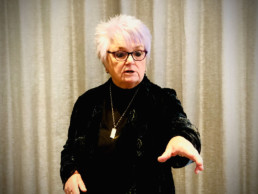Don't Dis Ma Dialect
What fun we are having with dialects! It all started as part of the writing of our new resource Talk:Write, aimed at improving children’s speech and writing through talk. This is, of course, a very familiar area for us but we have so many new messages to reflect advances in research and the government’s agenda on Standard English.
It’s gratifying for us to see the government so focussed on things we have been saying for 20 years – that the way children talk (or don’t talk) affects their performance as writers across the whole spectrum of education. It’s a surprise, however, that they make it sound like a new discovery! My guru of 20 years for talk, Dr. Todd Risley, died in 2007 – sadly. He has just been reborn in national reports.
In pursuing our own research, we realised that this whole initiative for institutionalised Standard English across all primary schools could prove detrimental for parents and communities, and the way they speak. This drive for improving communication cannot be seen as a criticism for the way whole communities speak. Thus, we undertook an analysis of the main types of speech and language found in communities in the English-speaking world.
And so we addressed dialects!
Dialects evolved before the days of free movement within countries prior to the development of public transport, inexpensive transport systems and revolutions in industry that led to mass relocations and a huge growth in cities. Originally, there was little movement outside the home locality for most of the population and their language developed its own accent, grammatical structures and – often – vocabulary for daily use. Due to their isolation, the dialects of different localities were diverse and often difficult for outsiders to access or understand.
Today, many communities are integrated with people of different accents and dialects living and working together. Families are divided and living in different parts of their own countries and other countries. Since ‘Windrush’ West Indian patois has had a huge influence on street talk across the country. Street talk and patois are both forms of dialect, now enriched by a mingling with words and phrases from the daily chat of so many, diverse communities.
I was born the youngest of four children who all grew up and were educated in Yorkshire, yet my mother was from Shropshire and my father was from Northumberland. My mother monitored our speech fiercely, determined that we should not speak with a Yorkshire accent or dialect, yet she and her sister (who lived with us for some years) often spoke in broad ‘Salopian’ – laughing heartily as they did so. It was from them that I learnt to say, ‘Thar cans’t’na sing ser good as thar cudst’cost?’
I consciously developed a Yorkshire accent as a young teen, to ‘fit in’ with the huge street gang – ‘The Oakwood Gang’ – that dominated our locality in the late 1950s and early ‘60s. We were a law-abiding rabble of around 60 teenagers who were purely gathering to socialise and have fun, but the police clearly had complaints from people who felt threatened, and frequently circled us in their Ford Anglia police cars – driving us away from the clock tower and into the woodland. I spoke Yorkshire on the streets and Standard English at home.
In my professional life I have consciously kept my Yorkshire accent, being proud of my heritage. Speaking in Yorkshire does not mean that the speaker is not speaking in Standard English. The latter purely means talking with grammatically correctly structures. I do that – except when I consciously switch into dialect. Imagine my hilarity when I attended a course on writing, as a recently launched independent consultant, led by a secondary English specialist back in the early 2000s. She was in full flow – but I was bored as she was saying nothing new or innovative – when my sub-conscious suddenly tuned in to her saying: ‘… a fat old Yorkshire woman setting herself up as a writing consultant and she can’t even speak English properly!’ I did laugh – she should see me now if she thought I was old 15 years ago!
I introduced myself at lunchtime…
Every Sunday we post a word on Twitter and ask folk to contribute any dialect forms they know of – particularly things that their grandparents might have said. Most weeks we gratefully receive around 100 responses and my colleague then makes an attractive free resource for teachers that we post on the website. We are always struck, however, how dialect has now morphed into what we would call ‘street talk’, it is now rarely confined to one specific locality. We often receive the same word or close versions of it, from North and South and from East to West. For example – this week’s free resource focussed on the word ‘hungry’. We received ‘starvin’’ from Sussex and ‘stervin’ from the Scottish Borders; ‘clammed’ from the Black Country and ‘clammin’ from Tyneside; all tributes to the spread of populations across the land.
Who knows what this week’s word will be and what it will bring?
Us’ll soon see thar knows’t!
Talk:Write
A fun and flexible approach to improving children’s vocabulary, speech, and writing.


